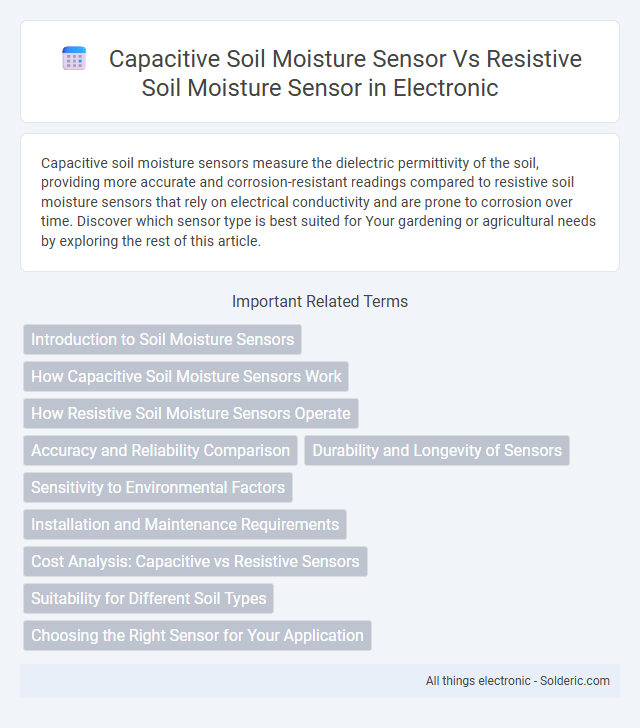Capacitive soil moisture sensors measure the dielectric permittivity of the soil, providing more accurate and corrosion-resistant readings compared to resistive soil moisture sensors that rely on electrical conductivity and are prone to corrosion over time. Discover which sensor type is best suited for Your gardening or agricultural needs by exploring the rest of this article.
Comparison Table
| Feature | Capacitive Soil Moisture Sensor | Resistive Soil Moisture Sensor |
|---|---|---|
| Measurement Principle | Measures changes in capacitance caused by soil moisture | Measures electrical resistance changes due to soil moisture |
| Durability | High resistance to corrosion, longer lifespan | Prone to corrosion, shorter lifespan |
| Accuracy | More accurate and stable readings | Less accurate, readings affected by soil salts and mineral content |
| Power Consumption | Lower power consumption | Higher power consumption |
| Cost | Generally higher cost | Lower cost, budget-friendly |
| Output Type | Analog voltage or digital output | Usually analog voltage output |
| Maintenance | Low maintenance due to corrosion resistance | Higher maintenance due to sensor degradation |
| Best Use Case | Long-term soil moisture monitoring in various soil types | Short-term or low-budget soil moisture projects |
Introduction to Soil Moisture Sensors
Soil moisture sensors measure the water content in soil to optimize irrigation and promote healthy plant growth. Capacitive soil moisture sensors use dielectric permittivity to detect moisture levels, offering corrosion resistance and longer lifespan compared to resistive sensors, which measure electrical resistance affected by soil conductivity. Capacitive sensors provide more accurate and stable readings, making them preferable for long-term soil monitoring in agriculture and gardening applications.
How Capacitive Soil Moisture Sensors Work
Capacitive soil moisture sensors measure the dielectric permittivity of the soil by detecting changes in capacitance caused by water content variations. Unlike resistive sensors, they use an insulated sensing plate to form a capacitor whose capacitance increases with soil moisture level. Your garden or agricultural system benefits from these sensors' durability and resistance to corrosion, ensuring more accurate and long-lasting soil moisture monitoring.
How Resistive Soil Moisture Sensors Operate
Resistive soil moisture sensors measure soil moisture by detecting changes in electrical resistance between two electrodes inserted into the soil; wetter soil decreases resistance while drier soil increases it. These sensors rely on the principle that water enhances the soil's conductivity, affecting the resistance value read by the sensor. The measured resistance is then converted into an electrical signal, which correlates with soil moisture levels for irrigation or monitoring applications.
Accuracy and Reliability Comparison
Capacitive soil moisture sensors offer higher accuracy and reliability compared to resistive sensors due to their ability to measure dielectric permittivity without direct exposure to soil ions, reducing corrosion and signal drift over time. Resistive sensors are prone to degradation from soil electrolytes, leading to inconsistent readings and a shorter lifespan. Your irrigation and plant care systems benefit from capacitive sensors' stable performance, ensuring precise moisture monitoring in varied soil conditions.
Durability and Longevity of Sensors
Capacitive soil moisture sensors offer superior durability and longevity compared to resistive sensors due to their non-contact sensing method, which reduces corrosion and wear over time. Resistive sensors commonly suffer from electrode degradation caused by soil salts and moisture, leading to a shorter lifespan and frequent maintenance needs. Choosing a capacitive sensor ensures your measurements remain reliable with minimal sensor replacement or calibration.
Sensitivity to Environmental Factors
Capacitive soil moisture sensors demonstrate higher resistance to environmental factors such as soil corrosion and salinity variations because they measure changes in dielectric permittivity rather than electrical resistance. Resistive soil moisture sensors are more prone to degradation from soil chemical composition and moisture-induced corrosion, leading to inaccurate readings over time. You can expect capacitive sensors to provide more reliable and stable moisture measurements in diverse soil conditions.
Installation and Maintenance Requirements
Capacitive soil moisture sensors offer easier installation with waterproof, corrosion-resistant materials, reducing the risk of signal degradation over time compared to resistive sensors. Resistive soil moisture sensors require regular cleaning and replacement due to electrode corrosion and soil buildup, increasing maintenance frequency. Capacitive sensors provide more stable, long-term performance with minimal upkeep, making them ideal for continuous monitoring applications.
Cost Analysis: Capacitive vs Resistive Sensors
Capacitive soil moisture sensors generally have a higher initial cost compared to resistive sensors due to their advanced sensing technology and better durability. Resistive sensors are cheaper but tend to degrade faster when exposed to soil moisture, leading to higher replacement costs over time. Investing in capacitive sensors can reduce long-term expenses by minimizing maintenance and ensuring more accurate soil moisture measurements.
Suitability for Different Soil Types
Capacitive soil moisture sensors exhibit high compatibility with various soil types due to their resistance to corrosion and minimal signal degradation caused by soil salinity or mineral content. Resistive soil moisture sensors may struggle in saline or clay-heavy soils, as electrochemical reactions on the sensor surface can lead to inaccurate readings and sensor deterioration. Capacitive sensors provide consistent and reliable moisture measurements across sandy, loamy, and clay soils, making them more suitable for diverse agricultural applications.
Choosing the Right Sensor for Your Application
Capacitive soil moisture sensors provide higher accuracy and durability by measuring dielectric permittivity, making them ideal for long-term agricultural or environmental monitoring. Resistive soil moisture sensors are cost-effective and simple but prone to corrosion and less reliable in saline soils, suited for short-term or hobbyist projects. Your choice depends on the need for precision, maintenance frequency, and soil conditions in your specific application.
capacitive soil moisture sensor vs resistive soil moisture sensor Infographic

 solderic.com
solderic.com